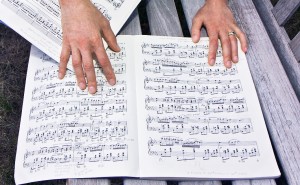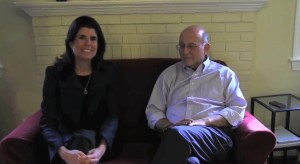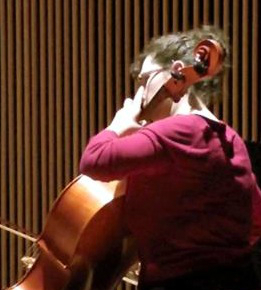For over a year, while studying Chopin’s Raindrop Prelude in my adult piano lessons, I often stumbled into an A-flat trap. In the expansion of the dreamy, opening melody, I launched off a bass A-flat into nowhere, flummoxed on which notes I should strike next. Three times I stumbled on the A-flat: at a New York Piano Society concert, a student recital, and at an audition for the Society’s Carnegie Gala (I did not make the final roster).
It was not until I would learn to put Body over Mind that I would repair this problem.
My cure began recently, when I attended a Be Evolution hot yoga class. A few mats over, my friend Roselle executed a graceful extended-hand-to-big-toe pose, her right leg soaring at a right angle to her body. I worked on inching my right leg into a forward kick. When our instructor, Jagadisha, issued his usual reminder to point my tail downwards, I frowned at myself with a scrunched forehead in the mirror.
“I can tell you’re a writer because you’re thinking a lot,” Roselle said to me with a smile after class. “You know, yoga should just be you and your body. Don’t let your mind get involved. If you want to tuck your tail down, just let your body to do that and move on.”
I felt chagrined that Roselle glided through her practice while at the same time observing my unsettled mind. Yet she had a good point, so I thanked her.
A few days later, at one of my adult piano lessons, my piano teacher Stephen helped me prepare to perform the Raindrop Prelude at my church. Stephen coached me to practice launching the music just before the A-flat and to memorize entry points in the score immediately following the trap.
At the piano that evening, I wondered whether Roselle’s advice might apply to my piano study. Perhaps I should put my body in charge of the Raindrop Prelude, particularly the first section with its lurking A-flat trap. I already had learned the Prelude’s notes, mastered the technique, and memorized the score, tasks appropriate for my mind to lead. Now I could allow my body take over.
On the piano bench, I inhaled and exhaled deeply, with intention, as though I were in yoga class. I blanked my mind to a pleasant neutrality, and the muscles in my forehead, cheeks, and jaw relaxed. Surprisingly, I felt grateful that the thinking part of myself no longer was responsible for the music’s outcome.
I rang out the sweet opening melody, then meandered through the opening section with feeling. Several measures beyond the A-flat, I realized I had sailed past that point without a hiccup. “Ah, the mind’s a funny thing,” Jagadisha says. “It knows what it’s doing, but sometimes it gets in the way.”
On Sunday, I took my place on the bench of our church’s Steinway grand piano for my performance. I silently coached my mind to let my body assume control. Once in the Prelude, I hesitated very briefly at the A-flat but then seamlessly picked up the ensuing notes. A few bars later, rattled at how close I had come to tripping into the A-flat trap, my fingers slipped on the keys, but I did not lose the music’s thread. Body over Mind, I chanted to myself as my fingers eased into the deep chords in the bass.
When I stood up from the antique grand piano, finished with the Prelude, I felt a deep satisfaction. It was my mind who had doubted. My body, with its motor memory, visceral connection to the melody, and ecstasy from its tones, had felt confident of the music all along.




0 Comments